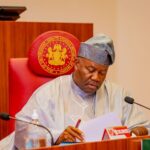The 10th National Assembly has passed several bills since its inauguration in June 2023. However, some sensitive or controversial bills remain pending, awaiting public hearings and passages. As federal lawmakers resume from recess on September 17, this report highlights the bills.
Bill on a six-year single term for presidents and governors
A bill seeking to amend the 1999 Constitution to introduce a single six-year term for the offices of president, state governors, and local government chairmen is currently pending in the House of Representatives. Titled the “Constitution of the Federal Republic of Nigeria 1999 (Alteration) Bill 2024,” the bill was sponsored by Rep. Ikenga Imo Ugochinyere and 50 other lawmakers.
The proposed legislation aims to amend Sections 7, 135, 137, 180, and 182 of the Constitution. For instance, Clause 2 proposes a new subsection (5) in Section 7, which stipulates that local government chairmen vacate office after a single term of six years. Clause 3 proposes amending Section 135 to replace “four” with “six,” thereby setting a single six-year term for the president.
- Despite poor access to agro-inputs, Kano farmers optimistic of bumper harvest
- Why illegal oil bunkering persists
Additional provisions include accounting for time spent in office before a re-run election and ensuring that the period served before an annulled election is considered part of the six-year term. Moreover, it allows the National Assembly to extend the president’s term during wartime, with each extension not exceeding six months at a time.
This bill has sparked debate among lawmakers and political analysts, with some arguing that it could reduce the disruptive nature of frequent elections, while others believe it could concentrate too much power in the hands of a single officeholder.
Bills on parliamentary system
Three bills proposing a shift from the current presidential system to a parliamentary system of government are also pending in the House of Representatives. Sponsored by Minority Leader, Kingsley Chinda and 59 others, the bills—titled “Constitution of the Federal Republic of Nigeria, 1999 (Alteration) Bill, 2024”—aim to alter the nation’s governance structure significantly. The proposed system would make the Prime Minister the head of government, while the president would serve as a ceremonial leader.
The sponsors of these bills have been actively consulting with key stakeholders to build support for the transition. They have met with notable figures, including former President Olusegun Obasanjo and former Head of State Gen. Ibrahim Babangida, to discuss the merits of a parliamentary system. The sponsors argue that this system could promote greater accountability and efficiency in governance, as the Prime Minister would be directly answerable to the legislature. They have proposed that the new system will take effect after President Tinubu and other current elected officials complete their second terms, thereby ensuring a smooth transition.
However, the bills face significant challenges, as many Nigerians are accustomed to the presidential system, and there are concerns about the feasibility of such a drastic change in governance.
Police Act Amendment Bill
A key bill currently before the House is the “Nigeria Police Act (Amendment) Bill, 2024 (HB 1461),” which seeks to amend the Nigeria Police Act 2020. Sponsored by Speaker Abbas Tajuddeen and Rep. Abubakar Makki Yalleman, this bill aims to extend the service years of police personnel to improve their experience and reduce the costs associated with training and recruiting new officers. The bill’s explanatory memorandum highlights the need to retain experienced personnel, which would enhance the morale, performance, and job satisfaction of police officers.
The bill had an accelerated first and second reading on May 21, 2024, and was subsequently referred to the House Committee on Police Affairs for further legislative action.
If passed, the bill is expected to address the shortage of experienced police personnel in the country, which has been a longstanding concern among security experts and the general public. The proposed amendment is also seen as a way to professionalise the police force and improve its operational effectiveness in tackling the country’s complex security challenges.
Ranches Commission Bill
The National Ranches Commission Establishment Bill, 2024, is one of the more controversial proposals currently awaiting a public hearing. Sponsored by Senator Titus Tartenger Zam (APC, Benue North West), the bill aims to establish ranches for herders within their states of origin, requiring their relocation. The bill proposes strict regulations, including a five-year jail term and a N50,000 fine for violations. It mandates that cattle movements be carried out by vehicular means only, prohibiting livestock from wandering or grazing outside designated ranches.
Despite facing stiff opposition from northern senators, who argue that the bill could disrupt the traditional nomadic lifestyle of herders, the bill passed second reading in the Senate on June 5.
The bill’s sponsor argues that the establishment of ranches would help address the recurring conflicts between herders and farmers, which have led to numerous fatalities and displaced communities in recent years.
Senate President Godswill Akpabio has assured the public that a comprehensive hearing will be conducted to gather inputs from all relevant stakeholders, including cattle herders, state governments, and civil society groups. However, no date has been set for this public hearing.
NIMC Act Repeal Bill
A bill to repeal the National Identity Management Commission Act, 2017, is also pending a public hearing in the Senate. The bill, titled “National Identity Management Commission (Repeal and Enactment) Bill 2024 (SB. 472),” was passed for a second reading on July 2, 2024. Sponsored by Deputy Senate President Barau I. Jibrin (Kano North), the bill seeks to expand the scope of registration to include all residents of Nigeria, not just citizens. This includes the establishment of a comprehensive national identity database to manage the registration and issuance of identity credentials.
The bill proposes that the registration process be made accessible at licensed centres both within Nigeria and abroad, thereby facilitating the inclusion of Nigerians in the diaspora. The bill’s inclusivity has raised concerns among some lawmakers, who argue that broadening the eligibility criteria could lead to security challenges.
However, proponents of the bill believe that it is necessary to ensure that all individuals residing in Nigeria are properly documented, which could aid in national planning and security efforts.
Part 1(2) of the bill, under the section titled ‘Application,’ clarifies that the Act would apply to both Nigerians and foreign nationals residing in the country. This broad scope is intended to ensure comprehensive coverage and facilitate the management and operation of the National Identity Database.
Bill seeking special seats for female legislators
Another significant bill before the House is a Constitution Alteration Bill proposing special seats for women in the National and State Houses of Assembly. Sponsored by Deputy Speaker Benjamin Kalu and 12 others, the bill passed its second reading on July 9, 2024, and was referred to the Committee on Constitution Amendment for further legislative action.
The bill proposes the creation of one additional legislative seat per state and the Federal Capital Territory (FCT), to be contested by women only, bringing the total to 74 seats. Additionally, it suggests three special seats for women in all 36 state houses of assembly, creating a total of 108 seats in state legislatures.
This bill, first introduced in the 9th National Assembly and sponsored by Hon. Nkeiruka Onyejeocha and 85 other members, including former Speaker, Femi Gbajabiamila, was stepped down during voting. The reintroduction of the bill in the 10th Assembly underscores the ongoing push for greater female representation in Nigeria’s political landscape.
Advocates argue that the bill is necessary to address the under-representation of women in Nigerian politics, while opponents caution against creating gender-specific seats, suggesting that efforts should instead focus on promoting equal opportunities for all.
Bill on diaspora voting
The bill on diaspora voting is another significant piece of legislation awaiting further legislative action. Sponsored by Speaker Abbas Tajuddeen and Rep. Sadiq Ango Abdullahi, the bill has already passed its second reading in the House. Section 1 of the bill guarantees the voting rights of Nigerian citizens living abroad, allowing them to participate in elections conducted by the Independent National Electoral Commission (INEC). This provision is seen as a significant step towards engaging the Nigerian diaspora in the country’s democratic process, which has been a longstanding demand from Nigerians living overseas.
Section 4 of the bill clarifies that it does not invalidate existing laws in Nigeria, rather provides a platform for diaspora participation. The bill has been referred to the Committee on Electoral Matters for further consideration. If passed, this legislation could have profound impact on future elections by expanding the voter base to include millions of Nigerians living abroad, thereby enhancing inclusivity.

 Join Daily Trust WhatsApp Community For Quick Access To News and Happenings Around You.
Join Daily Trust WhatsApp Community For Quick Access To News and Happenings Around You.



